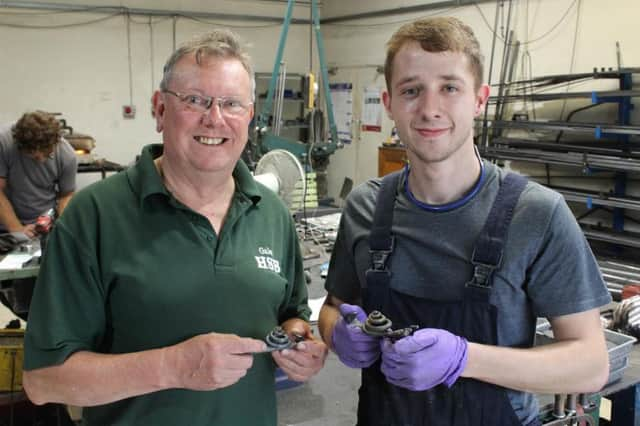Boss's appeal to help keep alive the UK's traditional craft skills


Nigel Tyas Ironwork has seen a young blacksmith apprentice take the lead on his first manufacturing project helping the business launch a brand new product.
Nigel Tyas, who set up the firm in 2000, told The Yorkshire Post that in the aftermath of the vote to leave the European Union it was important to protect traditional craft skills and ensure the country is more industrially productive.
Advertisement
Hide AdAdvertisement
Hide Ad“It is really important to keep these traditional skills alive in a mass-produced age,” he said.
“It’s important because a lot of our manufacturing has been outsourced abroad,” he added.
Mr Tyas said that craft skills are a part of the region’s heritage, especially in South Yorkshire with its steel-related industries.
While there has been a decline in many traditional hand-crafted industries, Mr Tyas thinks that the UK can still maintain and even increase its output in these fields.
Advertisement
Hide AdAdvertisement
Hide AdHe added: “With the change of scene with the Brexit vote we will need to be more productive as a nation in an industrial way rather than just in services. I see that as an area where young people need to get involved.”
Kieren Stables is an apprentice at South Yorkshire-based Nigel Tyas Ironwork.
The 22-year-old, who joined the firm three years ago, is hand-making ‘Brian the Snails’ – little steel characters which can be used as ornaments or coat hooks.
Mr Tyas says more needs to be done to get young people interested in traditional crafts and schools need to put more emphasis on vocational training.
Advertisement
Hide AdAdvertisement
Hide AdHe said: “I don’t think the school system really allows pupils to get a real good handle on making things. One of the biggest problems really is the emphasis on health and safety, which is fine we need that, but when I was at school we used to use the forge, melt aluminium and cast it.
“It was an exciting subject. Nowadays I don’t think it is. The only way to get young people really interested is to make it exciting.”
Mr Tyas added: “University isn’t for everybody. A greater emphasis needs to be put on to vocational training and I think that’s beginning to happen already.”
Speaking about Kieren Stables, Mr Tyas said: “He wasn’t a particularly academic young fellow but he’s got really, really good hand skills.
Advertisement
Hide AdAdvertisement
Hide Ad“It’s easy for youngsters nowadays to leave school with not very good results from their exams and think that they’re on the scrapheap, when actually they’ve possibly got fantastic practical skills.”
Despite technology encroaching on industry, Mr Tyas says there is still a demand for hand-crafted products across the sectors.
He said: “The fact is the demand for handmade is still very high in whatever sector it is. Whether it’s metal working, wood working, painting, every sector has a need.
“It comes with a price. I mean hand-crafted products are expensive compared to the run-of-the-mill stuff but that’s a premium that a lot of people are happy to pay because each product is individual.
Advertisement
Hide AdAdvertisement
Hide Ad“Although they’re made to similar patterns and the style is the same, each one is an individual and unique piece. It’s that uniqueness that people are interested in.”
Mr Tyas set up Nigel Tyas Ironwork in 2000 with his wife Elizabeth Stocker after he was made redundant for the fourth time in his career.
The company has grown steadily since and today employs nine people, with a turnover of around £500,000. The business is based in Bullhouse Mill, in the village of Millhouse Green, near Sheffield.